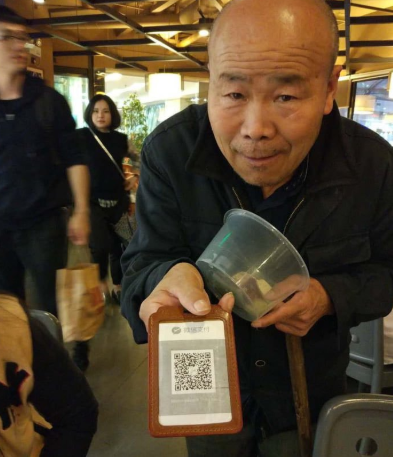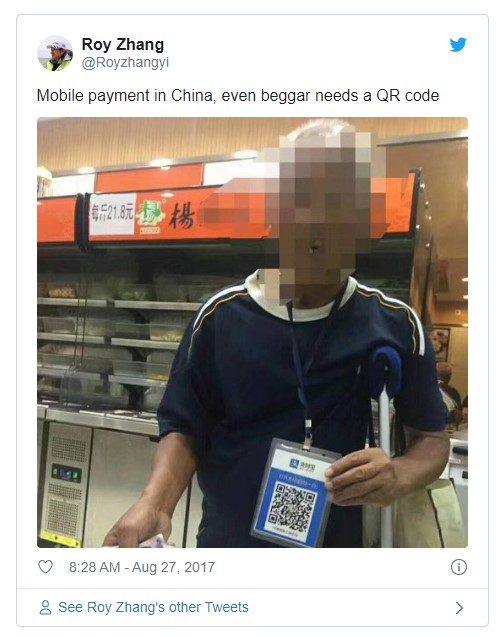No Tin Cans As Chinese Beggars Now Accept QR Code Mobile Payments
Harin - Jul 16, 2019

Chinese people, as well as tourists, are having to deal with beggars who have gotten rid of tin cans to use QR codes for collecting money.
- Mumbai 2020 Power Outage Might Be A China's Cyberattack, India Official Claims
- TikTok China Banned Users From Making Videos To Show Off Wealth
- Entrepreneur Spent 1 Year Building 600-Square-Meter Floating Mansion
For different cultures around the world, giving a beggar some loose change can be considered “doing good.” And beggars have their own ways of forcing people into giving them money. However, things can get annoying sometimes.
At some point, people have tried to use the excuse “no spare change” to fend off annoying beggars. But what if beggars have now adapted to convenient payment methods? Things might get a little bit tricky. And that is exactly what Chinese people, as well as tourists, are having to deal with.
Beggars in China have gotten rid of tin cans as they use QR codes for collecting money.

Reports suggest that these pesky beggar strategically stand at crowded tourist areas to ask for money. In China, most people use e-wallet apps like WeChat Wallet and Alipay or other mobile payment apps to scan and read QR codes for payment.
With China’s huge technological boom, “QR code beggars” can be found easily on the streets. Compared to other countries around the world, China’s transformation to a cash-free economy is faster. The company’s economy relies on the scannable codes.
Beggars don’t need a mobile phone to use QR codes. They only need a library to set up an account and a digital wallet.

Since 2016, Indians have been getting used to PayTM app for instant payments.
While cashless payment is common among Chinese beggars, things can get shady too. Reports state that some local start-ups and small businesses pay e-beggars for every scan that they receive.
So where’s the shady part you may ask? The thing is, with these scans, these businesses can extract user data through e-Wallet apps. All of the collected data is then sorted out and sold for marketing later.
Financial Express reports that Rs 7 to Rs 15 is how much beggars get for each scan. Beggars are not the only ones to use the QR code as it has been a prominent payment method in China, from paying at restaurants to brides wearing a QR tag to collect tips and gifts.
Denso Wave, a Japanese company invented the QR code system in 1994 for the tracking of vehicles during manufacturing. After that, the coding system slowly made it to online payments in Japan and South Korea. But no other countries have seen great success like China in using this payment system.
Featured Stories

Features - Jan 29, 2026
Permanently Deleting Your Instagram Account: A Complete Step-by-Step Tutorial

Features - Jul 01, 2025
What Are The Fastest Passenger Vehicles Ever Created?

Features - Jun 25, 2025
Japan Hydrogen Breakthrough: Scientists Crack the Clean Energy Code with...

ICT News - Jun 25, 2025
AI Intimidation Tactics: CEOs Turn Flawed Technology Into Employee Fear Machine

Review - Jun 25, 2025
Windows 11 Problems: Is Microsoft's "Best" OS Actually Getting Worse?

Features - Jun 22, 2025
Telegram Founder Pavel Durov Plans to Split $14 Billion Fortune Among 106 Children

ICT News - Jun 22, 2025
Neuralink Telepathy Chip Enables Quadriplegic Rob Greiner to Control Games with...

Features - Jun 21, 2025
This Over $100 Bottle Has Nothing But Fresh Air Inside

Features - Jun 18, 2025
Best Mobile VPN Apps for Gaming 2025: Complete Guide

Features - Jun 18, 2025
A Math Formula Tells Us How Long Everything Will Live
Read more

ICT News- Feb 18, 2026
Google's Project Toscana: Elevating Pixel Face Unlock to Rival Apple's Face ID
As the smartphone landscape evolves, Google's push toward superior face unlock technology underscores its ambition to close the gap with Apple in user security and convenience.

ICT News- Feb 19, 2026
Escalating Costs for NVIDIA RTX 50 Series GPUs: RTX 5090 Tops $5,000, RTX 5060 Ti Closes in on RTX 5070 Pricing
As the RTX 50 series continues to push boundaries in gaming and AI, these price trends raise questions about accessibility for average gamers.

Mobile- Feb 17, 2026
Anticipating the Samsung Galaxy S26 and S26+: Key Rumors and Specs
The Samsung Galaxy S26 series is on the horizon, sparking excitement among tech enthusiasts.
Comments
Sort by Newest | Popular